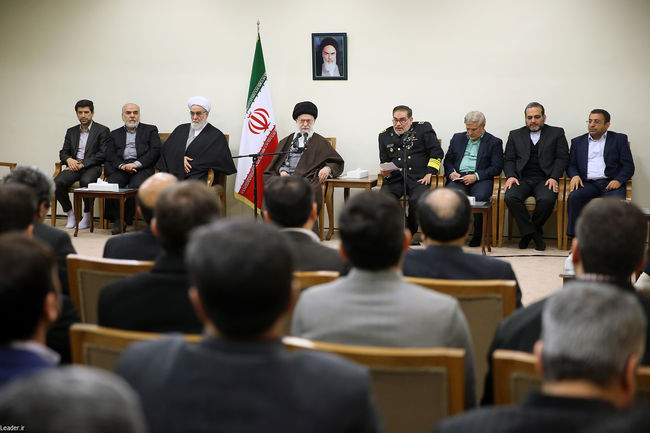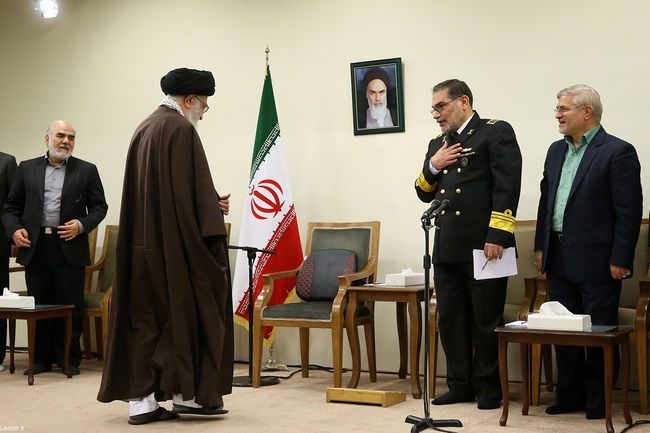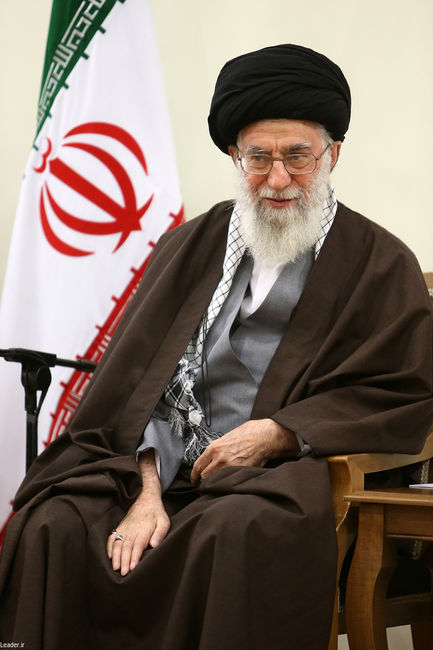Ayatollah Seyyed Ali Khamenei, the Leader of the Islamic Revolution, in a meeting with Rear Admiral Ali Shamkhani, secretary of the Supreme National Security Council (SNSC), and the deputies and experts of the Secretariat of the Council on Wednesday, referred to the complexity and diverse dimensions of the issue of “security” in today’s world.
During the meeting, Ayatollah Khamenei said the duty of the Supreme National Security Council consists of decision-making within the framework of a large-scale and multilateral approach to the issue of security, noting that the important task assigned to the Secretariat of the Council is “taking decisions” to pave the ground for correct “decision-making” within the Supreme National Security Council.
“For the Secretariat to play its very important role of decision-taking correctly and satisfactorily, the atmosphere dominating the Supreme National Security Council’s Secretariat and its orientations must be in full compliance with ‘correct and pure revolutionary and faithful way of thinking’.”
Noting that security is one of the most vital needs of the society and that it has been mentioned on many occasions in the Noble Quran, the Leader of the Islamic Revolution said: “Today, the issue of security is no longer limited to military and security issues and also incorporates economic, livelihood, cultural, political, social, psychological and ethical aspects.”
Ayatollah Khamenei said the main duty of the Supreme National Security Council is to take an all-embracing approach to the issue of security and take all its aspects into consideration, adding: “The Secretariat of the Council must accomplish the important task of decision-taking in such a way that making decisions by the Supreme National Security Council would take place on the basis of a correct and multidimensional view of security.”
Referring to the various activities of the Supreme National Security Council’s Secretariat, Ayatollah Khamenei said: “The Secretariat’s correct accomplishment of its task of decision-taking depends on the dominance of an ‘absolutely revolutionary atmosphere’ in this organ, because if orientations far from the Islamic Revolution gain influence within the Secretariat of the Supreme National Security Council no desirable result would be achieved.”
Emphasizing that “revolutionary orientations and tendencies” are not mere illusions and generalities, the Leader of the Islamic Revolution added: “Revolutionary tendencies and orientations are real and absolutely clear and obvious, and based on the remarks made by the [late] Imam [Khomeini] (the founder of the Islamic Republic).”
Highlighting efforts made by certain individuals and groups to distort the concepts of the Islamic Revolution, Ayatollah Khamenei said: “The [late] Imam is ‘the manifestation of Islamic Revolution’ and that is why his remarks, which have been complied in tens of volumes of books, elucidate the ‘fundaments of the Revolution’.”
The Leader of the Islamic Revolution said the points repeated in the remarks of Imam Khomeini set the “fundamental lines and principles of the Islamic Revolution,” adding: “Based on the late Imam’s remarks, the issue of ‘people’, ‘country’s independence’, ‘religiosity and commitment to Islamic fundamentals’, ‘fighting the arrogance and bullying’, ‘the issue of Palestine’, ‘the issue of people’s livelihood’, as well as ‘attention to the oppressed and eradication of poverty’ are the main lines of the Revolution, whose combination would generate the ‘geometry of the Revolution’.”
Stressing that decisions made by the Supreme National Security Council must lie within the framework of the main lines of the Islamic Revolution, Ayatollah Khamenei said: “The Supreme National Security Council and the Secretariat of this Council must be dominated by ‘correct and pure revolutionary thought of devoted people.”
“From the very beginning of the victory of the Islamic Revolution [in 1979], certain people disapproved of the revolutionary thought and some others, who were even within the [Islamic] establishment, did not believe in fighting against the arrogance; this current must be countered,” Ayatollah Khamenei said.
The Leader of the Islamic Revolution stressed that struggle has been constantly under way over the past 37 years, adding: “Of course today, in the light of new and complicated methods of the enemy, like cyberspace and its [negative] impacts on culture, beliefs, society and security, this struggle has turned tougher and more sensitive.”
Referring to the gradual and slow impact of the new methods used to guarantee the “intangible security of the society,” Ayatollah Khamenei said: “The Supreme National Security Council must deal with all these issues in different sectors [of the society] and make decisions, and on this basis, Secretariat of the Council must make correct decisions to fight complicated and new anti-security methods through effective thinking and indefatigable effort and expert work based on revolutionary thought.”
Concluding his remarks, Ayatollah Khamenei described Rear Admiral Ali Shamkhani as one of the very good reminders of the Sacred Defense (1980-1988 Iraqi imposed war on Iran) and extended his gratitude to Secretariat of the Supreme National Security Council for its endeavors and efforts in compiling helpful and timely reports on various issues.
Prior to Ayatollah Khamenei’s remarks, Mr. Shamkhani, secretary of the Supreme National Security Council, presented a report about the activities of the Secretariat.
Highlighting “policymaking,” “coordination” and “supervision” as the main three missions assigned to the Supreme National Security Council, Shamkhani said: “The Secretariat of this Council is tasked with supporting and providing specialized support for the Supreme National Security Council’s decisions and this potentiality must always serve the macro policies of the [Islamic] establishment and the Leadership and be [constantly] upgraded.”



